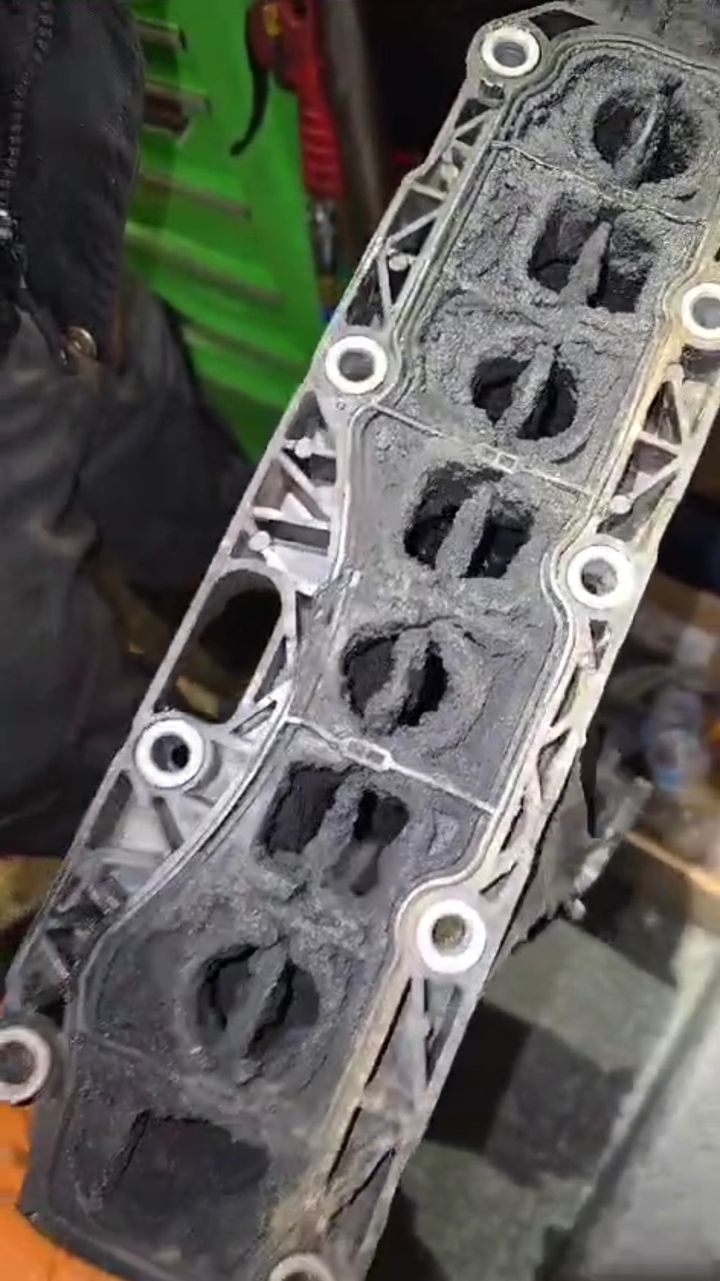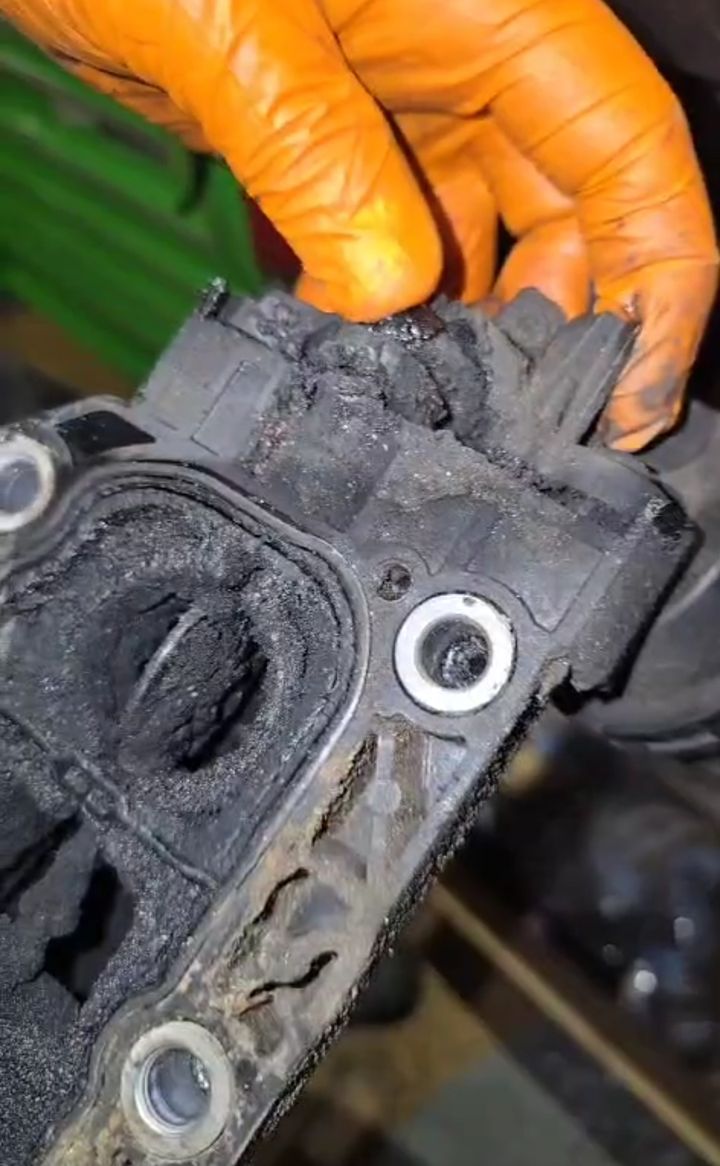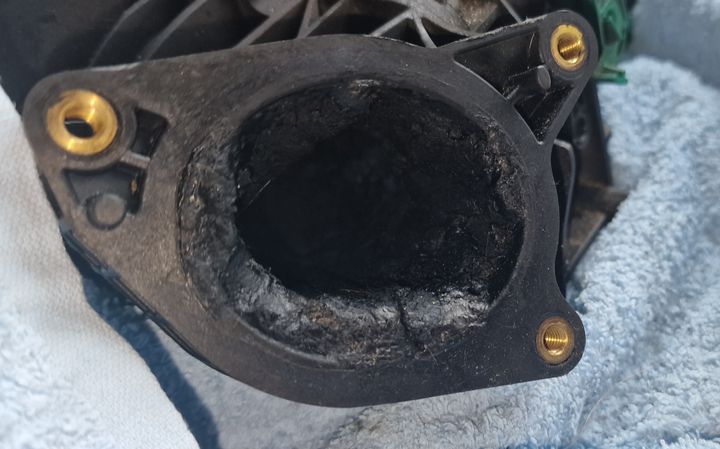Saving the Planet Trashed My Engine
Discussion
Is there any way to stop a diesel engine's intake manifold gunking up like this?

The vehicle is a Transporter T6 204 DSG bi-turbo. I bought it new, a factory order, and have only put the good diesel through it which is somewhat irrelevant to the manifold issue. It's a 2019 and has not given me any trouble whatsoever until, at around 96k the EML illuminated. There was no obvious loss of power, or so I thought. A fault diagnosis revealed a tumble - or swirl - flap issue on the intake manifold. I eventually got around to having it done and it turns out it wasn't as straight forward as I would have hoped: the module on the cooling fan had also developed a sporadic issue which made it it cut-in a lot regardless of the engine running or not. Annoyingly, the module is part of the fan and an OE jobbie is very ambitiously priced.
On the plus side, I've got my van back and it drives like it did when it was new. It has a new set of belts throughout and it feels very quick off the mark which shows that there actually was a dip in power low end which I couldn't tell on spirited motorway drives when it was coked up.
Even though there were quite a few parts on the list, the repair bill wasn't cheap.

Discussing the matter with those more knowledgable than I in these matters, other than blocking off and removing the EGR, there's nothing else I can do to prevent this from happening again. It's on its way to the same problem again although I don't know if I will keep the van or not; it's a lovely spec with two SLDs, tailgate, sitting on coilovers; has a leisure battery, LED pack reverse camera and pretty much every other option ticked, plus, has been looked after well.
Anyone else had anything similar? I suppose I should really be okay for the foreseeable, but it's on my mind that the crud is building up again. At least it's not killing the planet.
The vehicle is a Transporter T6 204 DSG bi-turbo. I bought it new, a factory order, and have only put the good diesel through it which is somewhat irrelevant to the manifold issue. It's a 2019 and has not given me any trouble whatsoever until, at around 96k the EML illuminated. There was no obvious loss of power, or so I thought. A fault diagnosis revealed a tumble - or swirl - flap issue on the intake manifold. I eventually got around to having it done and it turns out it wasn't as straight forward as I would have hoped: the module on the cooling fan had also developed a sporadic issue which made it it cut-in a lot regardless of the engine running or not. Annoyingly, the module is part of the fan and an OE jobbie is very ambitiously priced.
On the plus side, I've got my van back and it drives like it did when it was new. It has a new set of belts throughout and it feels very quick off the mark which shows that there actually was a dip in power low end which I couldn't tell on spirited motorway drives when it was coked up.
Even though there were quite a few parts on the list, the repair bill wasn't cheap.
Discussing the matter with those more knowledgable than I in these matters, other than blocking off and removing the EGR, there's nothing else I can do to prevent this from happening again. It's on its way to the same problem again although I don't know if I will keep the van or not; it's a lovely spec with two SLDs, tailgate, sitting on coilovers; has a leisure battery, LED pack reverse camera and pretty much every other option ticked, plus, has been looked after well.
Anyone else had anything similar? I suppose I should really be okay for the foreseeable, but it's on my mind that the crud is building up again. At least it's not killing the planet.
They all do that sir.

I think it's pretty much just something you have to live with for that generation of diesels. That's my N57 intake after about 95k. You basically have to think about it as a service item. You can pay about £500 for someone to clean it up, or as I did you can buy a newer cleaner intake for about £150, clean it all up and swap the gaskets.
In terms of stopping it, you'd have to either stop the soot or the oil vapour, so EGR delete or catch can would presumably work. For mine, I reckon it should be good for another 60k+ by which point I doubt the rest of the car will still be around, so I'm fairly relaxed about it.
I think it's pretty much just something you have to live with for that generation of diesels. That's my N57 intake after about 95k. You basically have to think about it as a service item. You can pay about £500 for someone to clean it up, or as I did you can buy a newer cleaner intake for about £150, clean it all up and swap the gaskets.
In terms of stopping it, you'd have to either stop the soot or the oil vapour, so EGR delete or catch can would presumably work. For mine, I reckon it should be good for another 60k+ by which point I doubt the rest of the car will still be around, so I'm fairly relaxed about it.
The same thing that caused that has another issue on the bitdis. Bits of metal flake off the egr cooler causing bore score. An egr blank prevents this but then it doesnt regen poroperly. If the dpf was to somehow fall apart internally you might notice you are about 8mpg better off, with more torque.
Map to switch EGR off is the easy solution. Bit of a tune at the same time will have it driving better and doing better mpg as well.
You can leave the DPF alone it will still work fine if done properly, adblue can usually be switched off if you want to save yourself from the almost inevitable four figure bill that will be along at some point when it fails.
You can leave the DPF alone it will still work fine if done properly, adblue can usually be switched off if you want to save yourself from the almost inevitable four figure bill that will be along at some point when it fails.
Glassman said:
E-bmw said:
I do get your frustration & why you posted but it didn't actually trash your engine though did it?
As above, I have done the same before, with a EU5/6 diseasel it is basically a service item as with early DI engine inlets.
Trash: Slang. To destroy or damage. As above, I have done the same before, with a EU5/6 diseasel it is basically a service item as with early DI engine inlets.
It required maintenance to bring it back up to scratch.
I do think as modern engines have (generally, but with some obvious exceptions) become more reliable people have more & more adopted the approach that maintenance is not really actually needed any more, except for an annual oil/filter change.
Unfortunately it still is, I drive reliable cars (in general) and will still spend a few hours every few months having a good look at things, checking things I haven't looked closely at in a while etc to keep things as they should.
I come from a maintenance background & have always done this with cars & bikes, so perhaps I am weird, or at least unusual.
E-bmw said:
I know what the word means but it didn't trash, destroy, or damage your engine.
It required maintenance to bring it back up to scratch.
I do think as modern engines have (generally, but with some obvious exceptions) become more reliable people have more & more adopted the approach that maintenance is not really actually needed any more, except for an annual oil/filter change.
Unfortunately it still is, I drive reliable cars (in general) and will still spend a few hours every few months having a good look at things, checking things I haven't looked closely at in a while etc to keep things as they should.
I come from a maintenance background & have always done this with cars & bikes, so perhaps I am weird, or at least unusual.
Decoking an inlet manifold is not maintenance, it’s repair. It required maintenance to bring it back up to scratch.
I do think as modern engines have (generally, but with some obvious exceptions) become more reliable people have more & more adopted the approach that maintenance is not really actually needed any more, except for an annual oil/filter change.
Unfortunately it still is, I drive reliable cars (in general) and will still spend a few hours every few months having a good look at things, checking things I haven't looked closely at in a while etc to keep things as they should.
I come from a maintenance background & have always done this with cars & bikes, so perhaps I am weird, or at least unusual.
It’s utterly silly that engines are needing relatively serious repairs at sub 100k mileages but it happens all too regularly even when maintained to the manufacturers standards (which is usually just an annual oil/filter change and a shake of the wheels).
Glassman said:
stevemcs said:
It’s normal for any modern diesel but vw’s are by far the worst. Also being a bi-tdi it’s done well to get this far without the engine failing spectacularly from other things
eekVid from Darkside, I'd say you were very lucky!
Gassing Station | Engines & Drivetrain | Top of Page | What's New | My Stuff





